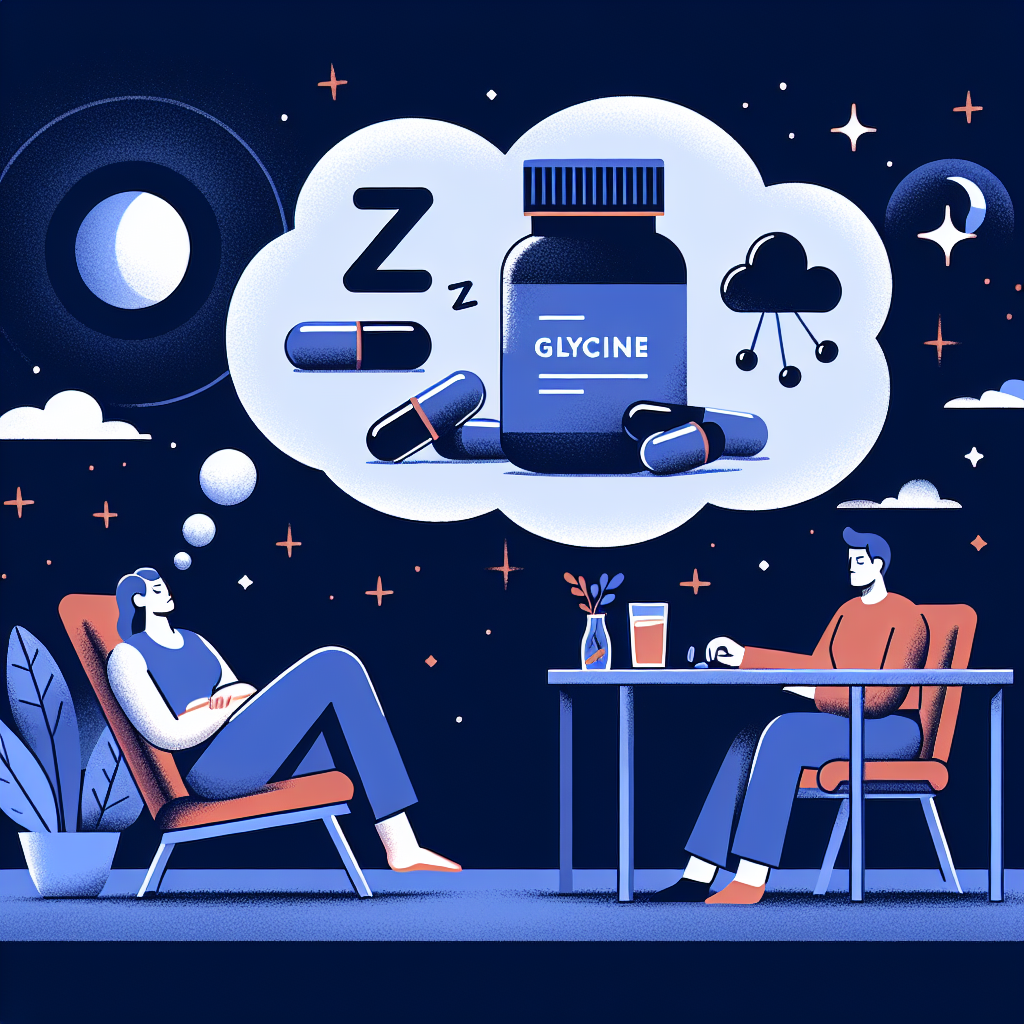The Benefits of Glycine Supplements for Sleep and Recovery

The Role of Glycine Supplements in Enhancing Sleep Quality and Duration
Glycine, a non-essential amino acid, has recently garnered attention for its potential benefits in improving sleep quality and aiding recovery. This simple amino acid, which the body can produce on its own, plays a crucial role in various physiological processes, including the synthesis of proteins. However, supplementing with glycine has been shown to offer additional health benefits, particularly in enhancing sleep quality and duration, which is essential for overall well-being and recovery.
The connection between glycine supplementation and improved sleep outcomes is supported by a growing body of scientific research. Glycine is believed to exert its sleep-promoting effects through several mechanisms. One of the primary ways is by lowering the body’s core temperature, a critical factor in initiating and maintaining a restful sleep. By facilitating the drop in body temperature that signals the brain it’s time to sleep, glycine helps individuals fall asleep more quickly and enjoy a deeper, more restorative sleep.
Moreover, glycine influences the nervous system in a way that promotes relaxation and reduces symptoms of insomnia. It acts as an inhibitory neurotransmitter in the central nervous system, which can help calm anxiety and quiet the mind, making it easier to fall asleep. This calming effect is particularly beneficial for those who struggle with sleep onset or experience restless nights due to stress or anxiety.
The benefits of glycine extend beyond just improving the onset and quality of sleep. Research indicates that glycine supplementation can also enhance the overall duration of sleep, allowing individuals to achieve the recommended amount of sleep more consistently. This is crucial, as insufficient sleep duration has been linked to a myriad of health issues, including impaired cognitive function, increased risk of chronic diseases, and poor recovery from physical activity.
Speaking of recovery, glycine’s role in promoting restful sleep indirectly supports the body’s recovery processes. Sleep is a critical time for the body to repair and regenerate tissues, especially after physical exertion. By improving sleep quality and duration, glycine supplementation can enhance the body’s natural recovery mechanisms, aiding in muscle repair and growth. This makes glycine an attractive supplement not only for individuals looking to improve their sleep but also for athletes and those engaged in regular physical activity.
Furthermore, glycine’s involvement in the synthesis of collagen, a protein essential for the health of connective tissues, skin, and bones, adds another layer to its recovery benefits. By supporting collagen production, glycine can aid in the healing of injuries and the maintenance of joint health, which is particularly important for individuals with active lifestyles.
In conclusion, glycine supplements offer a multifaceted approach to improving sleep and supporting recovery. By facilitating a quicker onset of sleep, enhancing sleep quality and duration, and aiding the body’s recovery processes, glycine presents a compelling case for its inclusion in the regimen of those seeking to optimize their health and well-being. As with any supplement, it’s advisable to consult with a healthcare professional before starting glycine supplementation, especially for individuals with pre-existing health conditions or those taking other medications.
How Glycine Aids Muscle Recovery and Overall Physical Health

Glycine, a non-essential amino acid, plays a pivotal role in the human body, influencing various physiological processes. Among its numerous benefits, glycine’s impact on sleep quality and muscle recovery stands out, offering a natural solution to common issues faced by many. This article delves into how glycine supplements can enhance sleep and aid in muscle recovery, ultimately contributing to overall physical health.
The connection between glycine and improved sleep quality is well-documented in scientific research. Glycine works by lowering the body’s core temperature, a signal that helps to initiate the sleep process. By facilitating the body’s transition into a state of rest, glycine helps individuals fall asleep more quickly and enjoy a deeper, more restorative sleep. This effect is particularly beneficial for those who struggle with sleep disorders or experience difficulty falling asleep. Moreover, the quality of sleep is crucial for muscle recovery and overall physical health. During deep sleep, the body undergoes various repair processes, including muscle growth and tissue repair. Therefore, by enhancing sleep quality, glycine indirectly supports the body’s natural recovery mechanisms.
Transitioning from the benefits of glycine on sleep to its direct impact on muscle recovery, it’s important to understand the role of amino acids in muscle health. Amino acids are the building blocks of protein, which is essential for muscle repair and growth. Glycine, in particular, is involved in the synthesis of creatine, a compound vital for energy production in muscle cells. This means that glycine supplementation can provide the muscles with the necessary components for efficient recovery after physical exertion. Additionally, glycine contributes to the production of collagen, a protein that plays a critical role in maintaining the strength and flexibility of connective tissues. This is particularly relevant for athletes or individuals engaged in regular physical activity, as it can help prevent injuries and ensure the longevity of their physical health.
Furthermore, glycine’s anti-inflammatory properties are another aspect that contributes to its effectiveness in supporting muscle recovery and overall physical health. Inflammation is a natural response to injury or strenuous exercise, but chronic inflammation can hinder the recovery process and lead to further health issues. Glycine helps to modulate the body’s inflammatory response, promoting a more balanced and efficient recovery process. This not only aids in quicker muscle recovery but also supports the health of other bodily systems, underscoring the comprehensive benefits of glycine supplementation.
In conclusion, glycine supplements offer a multifaceted approach to improving sleep and aiding muscle recovery, which are integral components of overall physical health. By enhancing sleep quality, glycine supports the body’s natural repair processes, while its role in creatine synthesis and collagen production directly benefits muscle recovery and health. Additionally, its anti-inflammatory properties further contribute to its effectiveness. Given these benefits, glycine supplementation emerges as a valuable tool for individuals looking to optimize their physical health and recovery processes. Whether you’re an athlete seeking to improve performance and recovery or someone looking to enhance sleep quality and physical well-being, glycine supplements may offer a natural and effective solution.
Exploring the Connection Between Glycine Supplementation and Reduced Fatigue
The Benefits of Glycine Supplements for Sleep and Recovery
In the quest for improved sleep and recovery, many individuals turn to dietary supplements. Among these, glycine, a non-essential amino acid, has garnered attention for its potential benefits. Glycine plays a pivotal role in various physiological processes, including the synthesis of proteins, the production of glutathione, a powerful antioxidant, and the regulation of neurotransmitters that influence sleep and mood. This article delves into the connection between glycine supplementation and reduced fatigue, exploring how this simple amino acid can significantly enhance sleep quality and aid in recovery.
Glycine’s impact on sleep is rooted in its ability to modulate the nervous system. Research suggests that glycine can lower body temperature, a critical factor in initiating sleep. By promoting a slight drop in core body temperature, glycine facilitates the onset of sleep, helping individuals fall asleep more quickly. Moreover, glycine has been shown to improve the quality of sleep. Studies indicate that individuals who supplement with glycine before bedtime experience deeper, more restful sleep and report feeling more refreshed upon waking. This effect is particularly beneficial for those struggling with sleep disorders or facing difficulties in achieving restorative sleep.
Transitioning from the benefits of glycine on sleep to its role in recovery, it’s essential to understand the interplay between sleep and recovery processes. Sleep is a critical period for physical and mental recovery. During sleep, the body undergoes various repair processes, including muscle growth, tissue repair, and the removal of toxins from the brain. By enhancing sleep quality, glycine indirectly supports these recovery mechanisms, contributing to overall health and well-being.
Furthermore, glycine’s role in reducing fatigue extends beyond its sleep-promoting effects. Glycine is involved in the synthesis of creatine, a compound vital for energy production in muscle cells. This relationship suggests that glycine supplementation could support physical performance and recovery by ensuring adequate creatine levels. Additionally, glycine’s antioxidant properties may protect cells from damage caused by free radicals, which are produced in greater quantities during physical activity. By mitigating oxidative stress, glycine aids in the recovery process, helping to reduce muscle soreness and fatigue.
The benefits of glycine supplementation for sleep and recovery are supported by a growing body of scientific evidence. However, as with any supplement, it’s important to approach glycine supplementation with caution. While glycine is generally considered safe for most people, it’s advisable to consult with a healthcare professional before adding it to your regimen, especially for individuals with pre-existing health conditions or those taking other medications.
In conclusion, glycine supplementation presents a promising avenue for enhancing sleep quality and supporting recovery. Its ability to modulate the nervous system, improve sleep architecture, and contribute to energy production and antioxidant defense mechanisms underscores its potential as a valuable supplement for those seeking to improve their sleep and recovery processes. As research continues to unravel the multifaceted benefits of glycine, it stands as a testament to the profound impact that even the simplest molecules can have on our health and well-being.